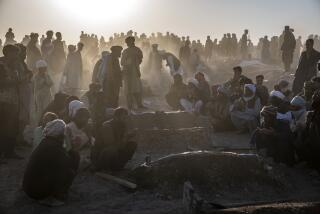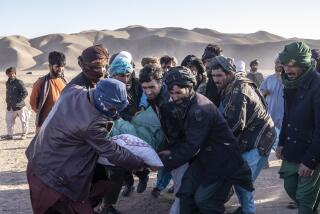Afghan Warlord Cedes His Citadel
- Share via
HERAT, Afghanistan — For seven centuries, the mud-brick fortress that towers over this city has been a shrine to the absolute power of the men who have fought great battles to control its ramparts.
This time, however, the citadel was turned over in peace -- by a warlord to Afghan national police.
Early Tuesday, the citadel that has stood since 1305 was surrendered to the forces of Afghan President Hamid Karzai by about 300 militia fighters of warlord Ismail Khan, whom Karzai had removed Saturday as Herat’s governor.
The agreement could serve as a symbol of the peaceful push to unite Afghanistan under a single national leader. But with Khan still maintaining his militia and many Herat residents angry about his dismissal, it is not yet clear whether things will remain peaceful in the long run.
“We hope that the situation will be peaceful from now on, but we cannot say what will happen in the future,” said Gen. Alhaj Ziauldin Mahmoodi, Khan’s security commander in Herat.
Enraged by Karzai’s sudden removal of the popular governor Saturday, several thousand protesters burned United Nations buildings here, and U.S. forces had to help rescue the U.N. staff. At least seven of the rioters were shot dead, and dozens more were wounded.
Less than three days later, Khan had his fighters hand over the fortress in the city’s center to Karzai’s national police.
Peace quickly returned to the city, which has long been an island of stability and prosperity in a country racked by war. But most of its people are still angry that Khan, the governor they credit with making Herat safe and stable, was ousted by an unelected leader far away in Kabul.
In interviews here, several Heratis accused the United States of trying to impose its will because U.S. Ambassador Zalmay Khalilzad played a public role in persuading Khan to quit. U.S. military surveillance helicopters continued to patrol the city Tuesday, on constant watch for any sign of trouble.
“Whatever happens in Afghanistan, the Americans are responsible for it,” said Ghulam Sarwar, who owns six carpet stores in downtown Herat.
Karzai has been unable to persuade Khan to give up his private army and join the government in Kabul, leaving the Afghan leader a long way from celebrating victory in his latest conflict with the nation’s powerful warlords.
Khan’s dismissal just a month before Afghanistan’s presidential election has fueled speculation among Heratis that the president wanted Khan out of the way because he supports Younis Qanooni, Karzai’s main election challenger.
“He’s trying to put his soldiers all around the city, and manipulate the city,” said Sarwar, 45. “But as long as Khan is here, no one will vote for President Karzai.”
Violence could erupt again if Heratis feel the stability they have enjoyed for more than 20 years under Khan is threatened, Sarwar warned.
“If anything happens against their culture and tradition, people will come out into the streets, no matter whether it’s today or tomorrow,” he said.
Khan is an ethnic Tajik veteran of the mujahedin guerrilla war against the Soviet occupation in the 1980s. He was later jailed by the Taliban regime but escaped with his guards in 2000.
Khan is also a leader of the Northern Alliance that helped U.S. forces oust the Taliban in late 2001. But after the Taliban fell, U.S. officials accused Khan of being too close to the government in neighboring Iran.
Khan has allowed Karzai’s choice for governor, Sayed Mohammed Khairkhwa, to move into the governor’s office. But Khan will remain the dominant power in western Afghanistan as long as his militia fighters keep their weapons.
He is holed up in his mansion now, guarded by his fighters while negotiating with Karzai’s envoys. Khan hasn’t said publicly whether he would disarm his men. He has defied Karzai’s command to go to Kabul and become minister of mines and industries.
Khan thinks an engineer would be better suited for the job and refuses to go to the capital until after the Oct. 9 presidential election, said Mahmoodi, the security commander.
Khan is one of several former mujahedin guerrillas, or holy warriors, who have challenged Karzai’s rule by withholding taxes and continuing to maintain their own private armies. The mujahedin forced Soviet troops to withdraw from Afghanistan, and Khan built on his popularity by helping Herat escape the ravages of the civil war that followed the Soviet pullout.
But many of the mujahedin leaders are notoriously corrupt, and at a news conference in Kabul on Monday, Karzai dismissed their claims to authority.
“I am a mujahed myself, and those who are driving in the fanciest cars cannot say that they are the representatives of the mujahedin,” Karzai said.
With an emphatic shift of his green cape, Karzai insisted that governors must take orders from him.
“The central government makes decisions and everyone has to agree,” he said.
As he struggles to disarm the warlords’ militias, Karzai is having trouble building a national army to replace them. After more than two years of training by the U.S. and its Western allies, the Afghan army has just 16,000 of the 75,000 soldiers it needs.
Khan’s central corps commander ordered his militia fighters to hand over control of the Qala-i-Ikhtiyaruddin fortress to the national police and go back to barracks on a base now under Afghan army supervision.
The national police unit holding the fort is made up of Tajiks from the Panjshir Valley more than 400 miles to the east. Most Heratis are also Tajiks and normally get along well with Panjshiris.
On Monday, however, about 5,000 Heratis violently protested Khan’s dismissal.
Khan’s men who remained in the fortress helped save the national police from the rioters who were throwing rocks and pieces of wood, and trying to break down the fortress’ large wooden doors, said national police officer Shukrullah, who, like many Afghans, uses only one name.
“The militiamen shouted at them, telling them, ‘These are not bad people, they are here for our own good,’ ” Shukrullah said. “So they left.”
But after the 200 national police officers were left on their own in the fortress, they seemed nervous about further confrontations in which they would have to fight off the mob themselves.
More to Read
Sign up for Essential California
The most important California stories and recommendations in your inbox every morning.
You may occasionally receive promotional content from the Los Angeles Times.













